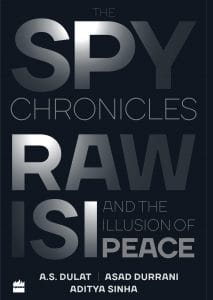‘The Spy Chronicles: Raw, ISI and the Illusion of Peace’ is an intriguing read end-to-end just for what the former Pakistani spy chief reveals and doesn’t.
‘Spy Chronicles,’ a series of conversations between the former spy chiefs of India and Pakistan, A.S. Dulat and Asad Durrani respectively, is a fascinating look at some of the most intractable issues that both men dealt with in their time – be it the Kashmir issue or the Narendra Modi doctrine or the response the name ‘Ajit Doval’ evokes in Pakistan.
Dulat was head of India’s external intelligence agency RAW between 1999-2000, while Durrani was head of Pakistan’s Inter-Services Intelligence, ISI, between 1990-92.
It is engrossing to read the book end-to-end to see what the former Pakistani spy chief left out. Durrani was perhaps one of the most powerful men in all of Pakistan as the Cold War drew to an end – a war which enormously impacted his country as the Soviets withdrew from Afghanistan in 1989 and as a result, so did the Americans. Of course, Durrani is too smart to refuse to answer a question. But the fact that he parries the most important ones may be put down to the fact that the questioner didn’t push him enough. What is, possibly, closer to the truth is that Durrani just didn’t want to say – that is what is so interesting.
Here’s the first example. On page 17 of the book, Dulat lets slip that it was the Indian spy agency, RAW, which tipped the ISI off on the attacks against serving president Pervez Musharraf after 9/11. But Durrani never picks up the cue. Then there’s the time when Durrani states that it was the Pakistani establishment which ‘cooperated’ with the Americans on giving up Osama Bin Laden; interestingly, Dulat agrees. According to Durrani, the Pakistanis cooperated because “the risk was so high that the consideration that we would alert someone was sacrificed in return for cooperation.”
If just both these facts are true, then historians – and journalists – must revise the understanding of their own timelines. Did Pakistan really tip off Obama on Laden’s whereabouts and allow three US Navy Seal helicopters into his compound in Abbottabad in the dead of night between 1 and 2 May, 2012? So why keep poor Dr Afridi still in lock-up? In answer, Durrani says that when the Americans found the doctor they told then Pakistani army chief Kayani, that either you tell us what’s going on or you don’t. Durrani implies that Kayani did.
Durrani’s remarks on both Prime Minister Modi and national security adviser Ajit Doval are more revealing than anything in any Pakistani newspaper so far – if only for this, the book is worth it. Notwithstanding Dulat’s own comments that Doval should be invited to Pakistan (he served there in the early 90s), it is interesting to read why Durrani remains unconvinced.
You can also accuse Durrani of some whataboutery in his insistence that the Indian ‘deep state’ or establishment is at least as determined as that of Pakistan, no matter Dulat’s remonstrations that most prime ministers wield the real stick. He believes that the Indian bureaucracy refused to allow Manmohan Singh to go to Pakistan in early 2007 – he is probably right.
Certainly, Dulat comes across as the more open man, admitting India’s inability and insensitivity in understanding and dealing with Kashmir — and often despairing as well. It is difficult to find Durrani admitting to the fundamental and serious failing that the army controls Pakistan’s muscle and sinews too — although he does admit to the completely foolish misadventure that was Kargil.
Nor does Durrani hide his distaste for elected prime minister Nawaz Sharif – as he tells Musharraf, “theek hai, jaane ki kya zaroorat thi”, referring to Nawaz’s trip to Washington DC during Kargil, only to be told by then US President Bill Clinton that he has to walk Pakistani troops back across the Line of Control.
Certainly, the several references to whisky-drinking across locales like Istanbul and Kathmandu are meant to tell you that Pakistanis aren’t faint caricatures of the dire, fearful mullah-cum-terrorist type men they are often made out to be.
As for the book’s fundamental premise, that whatever the problems between the governments of India and Pakistan, both peoples must be allowed to meet, is both welcome and agreeable, and must be supported with a show of both hands.
 ‘
‘
The Spy Chronicles RAW, ISI and the Illusion of Peace by
Read an extract of the book here.






